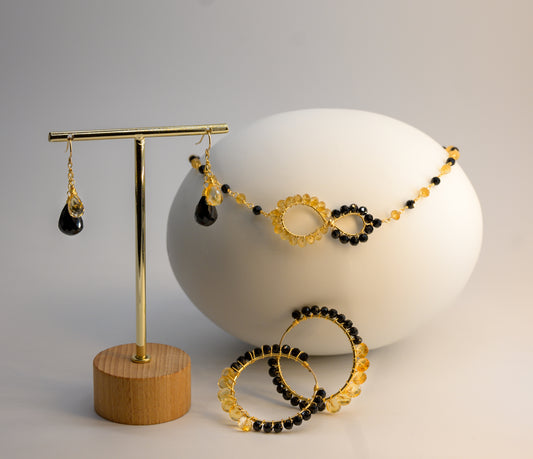The months of May and June bring forth a delightful array of birthstones, each with its own unique beauty, history, and symbolism. May is graced by the lush green emerald, while June offers three stunning options: pearl, alexandrite, and moonstone. Let's delve into the fascinating world of these birthstones and discover what makes them so special.
May: The Majestic Emerald
History and Origin
Emeralds have been cherished for thousands of years, with the earliest known mines dating back to ancient Egypt around 1500 BCE. The name "emerald" comes from the Greek word "smaragdus," which means green. These precious stones were highly prized by pharaohs and were considered symbols of eternal life and rebirth.
Characteristics and Value
Emeralds are a variety of the mineral beryl and owe their vibrant green color to trace amounts of chromium and vanadium. They are typically found in Colombia, Brazil, Zambia, and Zimbabwe. The value of an emerald is determined by its color, clarity, cut, and carat weight. The most sought-after emeralds exhibit a deep, rich green hue with minimal inclusions.
Symbolism and Meaning
Emeralds are often associated with love, wisdom, and growth. They are believed to bring harmony to relationships and provide the wearer with the ability to see into the future. In ancient times, emeralds were thought to have healing properties and were used to treat various ailments, including eye strain and epilepsy.
Check out our Leaf Collection - Emerald Necklace

Check out our Leaf Collection - Emerald Earrings

Check out our Leaf Collectioin - Emerald Drop Necklace

June: A Trio of Treasures
Moonstone: The Mystical Gem
History and Origin
Moonstone has been revered for centuries and is named for its shimmering appearance, reminiscent of moonlight. It has been used in jewelry by ancient civilizations, including the Romans and the Greeks, who believed it was formed from moonbeams.
Characteristics and Value
Moonstone belongs to the feldspar mineral group and exhibits a phenomenon called adularescence, a soft, billowy light effect that appears to float just below the surface of the stone. The most valuable moonstones are transparent and have a strong blue sheen. They are primarily found in Sri Lanka, India, and Madagascar.
Symbolism and Meaning
Moonstone is considered a stone of inner growth and strength. It is often associated with the divine feminine and is believed to enhance intuition, creativity, and emotional balance. White moonstone fortifies feminine energy and improves women's health, particularly in balancing hormonal cycles and reducing symptoms of PMS and menopause. It regulates the menstrual cycle, supports fertility, and eases childbirth. In many cultures, moonstone is thought to bring good fortune and protection during travel.
Check our our Boost Collection - Moonstone bracelet

Check out our Leaf Collection - White Moonstone necklace

Check out our Leaf Collection - White Moonstone necklace

Check out our Boost Collection - Moonstone Earrings

Pearl: Nature's Organic Gemstone
History and Origin
Pearls have been adored since ancient times and were once considered the most valuable gemstones. They form within the soft tissue of a living mollusk, making them unique among gemstones. Historically, pearls were harvested from the Persian Gulf, the Red Sea, and the coastal waters of India and Japan.
Characteristics and Value
Pearls come in various shapes, sizes, and colors, including white, black, pink, and gold. Their value is determined by their luster, surface quality, shape, and size. Natural pearls are incredibly rare, and most pearls on the market today are cultured, meaning they are created with human intervention.
Symbolism and Meaning
Pearls symbolize purity, innocence, and wisdom. They are often associated with the moon and have been used in bridal jewelry for centuries. In many cultures, pearls are believed to bring good luck and protect the wearer from harm.
Alexandrite: The Color-Change Marvel
History and Origin
Discovered in the Ural Mountains of Russia in the early 1830s, alexandrite was named in honor of the future Tsar Alexander II. This gemstone is renowned for its remarkable ability to change color depending on the lighting conditions, appearing green in daylight and red under incandescent light.
Characteristics and Value
Alexandrite is a rare variety of the mineral chrysoberyl and is valued for its color-changing properties. The most prized alexandrites display a vivid green to purplish-red shift. Major sources of alexandrite include Russia, Brazil, Sri Lanka, and East Africa.
Symbolism and Meaning
Alexandrite is associated with good fortune, creativity, and love. It is believed to enhance self-esteem and bring about positive change. The gemstone's ability to change color symbolizes adaptability and balance in life.
Conclusion
May and June birthstones offer a rich tapestry of colors, histories, and meanings. Whether you are drawn to the lush green of the emerald, the classic elegance of the pearl, the intriguing color change of alexandrite, or the mystical glow of moonstone, each gemstone brings its own unique charm and significance. Wearing these birthstones not only adds beauty to your life but also connects you to the timeless traditions and beliefs that have made these gems cherished throughout the ages.











